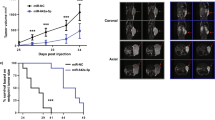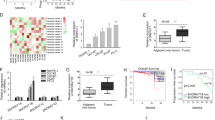Abstract
The tyrosine kinase Src is frequently activated in advanced human prostate carcinomas and its activation correlates with tyrosine phosphorylation of the RNA-binding protein Sam68. Herein, we have investigated the expression and function of Sam68 in human prostate cancer cells. Analysis of specimens obtained from 20 patients revealed that Sam68 is upregulated at the protein level in 35% of the samples. Real-time polymerase chain reaction confirmed the results at the mRNA level in most patients. Downregulation of Sam68 by RNAi in LNCaP prostate cancer cells delayed cell cycle progression and reduced the proliferation rate. Moreover, depletion of Sam68 sensitized cells to apoptosis induced by DNA-damaging agents. Similarly, stable cell lines expressing a truncated GFP-Sam68GSG protein displayed reduced growth rates and higher sensitivity to cisplatin-induced apoptosis. Microarray analyses revealed that a subset of genes involved in proliferation and apoptosis were altered when Sam68 was knocked down in LNCaP cells. Our results indicate that Sam68 expression supports prostate cancer cells proliferation and survival to cytotoxic agents.
This is a preview of subscription content, access via your institution
Access options
Subscribe to this journal
Receive 50 print issues and online access
$259.00 per year
only $5.18 per issue
Buy this article
- Purchase on Springer Link
- Instant access to full article PDF
Prices may be subject to local taxes which are calculated during checkout






Similar content being viewed by others
Abbreviations
- PCa:
-
prostate carcinoma
- STAR:
-
signal transduction and activation of RNA metabolism
- cdk:
-
cyclin dependent kinase
- EDTA:
-
ethilenediaminetetraacetic acid
- DMSO:
-
dimethyl-sulfoxide
- BSA:
-
bovine serum albumin
- SDS:
-
sodium dodecyl sulfate
- BrdU:
-
5-bromo-2-deoxyuridine
- MTS:
-
[3-(4,5-dimethylthiazol-2-yl)-5-(3-carboxymethoxyphenyl)-2-(4-sulfophenyl)-2H-tetrazolium, inner salt]
References
Barlat I, Maurier F, Duchesne M, Guitard E, Tocque B, Schweighoffer F . (1997). A role for Sam68 in cell cycle progression antagonized by a spliced variant within the KH domain. J Biol Chem 272: 3129–3132.
Burd CJ, Petre CE, Morey LM, Wang Y, Revelo MP, Haiman CA et al. (2006). Cyclin D1b variant influences prostate cancer growth through aberrant androgen receptor regulation. Proc Natl Acad Sci USA 103: 2190–2195.
Chen T, Boisvert FM, Bazett-Jones DP, Richard S . (1999). A role for the GSG domain in localizing Sam68 to novel nuclear structures in cancer cell lines. Mol Biol Cell 10: 3015–3033.
Cote J, Boisvert FM, Boulanger MC, Bedford MT, Richard S . (2003). Sam68 RNA binding protein is an in vivo substrate for protein arginine N-methyltransferase 1. Mol Biol Cell 14: 274–287.
Coyle JH, Guzik BW, Bor YC, Jin L, Eisner-Smerage L, Taylor SJ et al. (2003). Sam68 enhances the cytoplasmic utilization of intron-containing RNA and is functionally regulated by the nuclear kinase Sik/BRK. Mol Cell Biol 23: 92–103.
Denegri M, Chiodi I, Corioni M, Cobianchi F, Riva S, Biamonti G . (2001). Stress-induced nuclear bodies are sites of accumulation of pre-mRNA processing factors. Mol Biol Cell 12: 3502–3514.
Feldman BJ, Feldman D . (2001). The development of androgen-independent prostate cancer. Nat Rev Cancer 1: 34–45.
Grossmann ME, Huang H, Tindall DJ . (2001). Androgen receptor signaling in androgen-refractory prostate cancer. J Natl Cancer Inst 93: 1687–1697.
Irby RB, Yeatman TJ . (2000). Role of Src expression and activation in human cancer. Oncogene 19: 5636–5642.
Lee LF, Guan J, Qiu Y, Kung HJ . (2001). Neuropeptide-induced androgen independence in prostate cancer cells: roles of nonreceptor tyrosine kinases Etk/Bmx, Src, and focal adhesion kinase. Mol Cell Biol 21: 8385–8397.
Li HR, Wang-Rodriguez J, Nair TM, Yeakley JM, Kwon YS, Bibikova M et al. (2006). Two-dimensional transcriptome profiling: identification of messenger RNA isoform signatures in prostate cancer from archived paraffin-embedded cancer specimens. Cancer Res 66: 4079–4088.
Lukong KE, Larocque D, Tyner AL, Richard S . (2005). Tyrosine phosphorylation of sam68 by breast tumor kinase regulates intranuclear localization and cell cycle progression. J Biol Chem 280: 38639–38647.
Lukong KE, Richard S . (2003). Sam68, the KH domain-containing superSTAR. Bioch Biophys Acta 1653: 73–86.
Matter N, Herrlich P, Konig H . (2002). Signal-dependent regulation of splicing via phosphorylation of Sam68. Nature 420: 691–695.
Migliaccio A, Castoria G, Di Domenico M, de Falco A, Bilancio A, Lombardi M et al. (2000). Steroid-induced androgen receptor-oestradiol receptor β-Src complex triggers prostate cancer cell proliferation. EMBO J 19: 5406–5417.
Nam S, Kim D, Cheng JQ, Zhang S, Lee JH, Buettner R et al. (2005). Action of the Src family kinase inhibitor, dasatinib (BMS-354825), on human prostate cancer cells. Cancer Res 65: 9185–9189.
Palapattu GS, Sutcliffe S, Bastian PJ, Platz EA, Di Marzo AM, Isaacs WB et al. (2005). Prostate carcinogenesis and inflammation: emerging insights. Carcinogenesis 26: 1170–1181.
Paronetto MP, Farini D, Sammarco I, Maturo G, Vespasiani G, Geremia R et al. (2004). Expression of a truncated form of the c-Kit tyrosine kinase receptor and activation of Src kinase in human prostatic cancer. Am J Path 164: 1243–1251.
Paronetto MP, Venables J, Elliott D, Geremia R, Rossi P, Sette C . (2003). Tr-Kit promotes the formation of a multimolecular complex composed by Fyn, PLCγ1 and Sam68. Oncogene 22: 8707–8715.
Paronetto MP, Zalfa F, Botti F, Geremia R, Bagni C, Sette C . (2006). The nuclear RNA-binding protein Sam68 translocates to the cytoplasm and associates with the polysomes in mouse spermatocytes. Mol Biol Cell 17: 14–24.
Reddy TR, Xu W, Mau JK, Goodwin CD, Suhasini M, Tang H et al. (1999). Inhibition of HIV replication by dominant negative mutants of Sam68, a functional homolog of HIV-1 Rev. Nat Med 5: 635–642.
Richard S, Yu D, Blumer KJ, Hausladen D, Olszowy MW et al. (1995). Association of p62, a multifunctional SH2- and SH3-domain-binding protein, with src family tyrosine kinases, Grb2, and phospholipase C gamma-1. Mol Cell Biol 15: 186–197.
Ruggero D, Sonenberg N . (2005). The Akt of translational control. Oncogene 24: 7426–7434.
Sette C, Paronetto MP, Barchi M, Bevilacqua A, Geremia R, Rossi P . (2002). Tr-kit-induced resumption of the cell cycle in mouse eggs requires activation of a Src-like kinase. EMBO J 21: 5386–5395.
Soros VB, Carvajal HV, Richard S, Cochrane AW . (2001). Inhibition of human immunodeficiency virus type 1 Rev function by a dominant-negative mutant of Sam68 through sequestration of unspliced RNA at perinuclear bundles. J Virol 75: 8203–8215.
Taylor SJ, Resnick RJ, Shalloway D . (2004). Sam68 exerts separable effects on cell cycle progression and apoptosis. BMC Cell Biol 5: 5–16.
Venables JP . (2006). Unbalanced alternative splicing and its significance in cancer. Bioessays 28: 378–386.
Zhang C, Li HR, Fan JB, Wang-Rodriguez J, Downs T, Fu XD et al. (2006). Profiling alternatively spliced mRNA isoforms for prostate cancer classification. BMC Bioinformat 7: 202–213.
Zhou J, Scholes J, Hsieh JT . (2003). Characterization of a novel negative regulator (DOC-2/DAB2) of c-Src in normal prostatic epithelium and cancer. J Biol Chem 278: 6936–6941.
Acknowledgements
We wish to thank Professor S Di Stasi for help with patients recruitment, Professor R Geremia for helpful discussion; Dr Andrea Bianchini for microarray data analysis; Drs Ezio Giorda and Rita Carsetti for help with FACS analysis. This work was supported by grants from the Associazione Italiana Ricerca sul Cancro (AIRC) and the Italian Ministry of Education (PRIN 2004) to CS MP Paronetto is supported by a Post-doctoral scholarship from the IRCCS Fondazione Santa Lucia.
Author information
Authors and Affiliations
Corresponding author
Additional information
Supplementary Information accompanies the paper on the Oncogene website (http://www.nature.com/onc).
Supplementary information
Rights and permissions
About this article
Cite this article
Busà, R., Paronetto, M., Farini, D. et al. The RNA-binding protein Sam68 contributes to proliferation and survival of human prostate cancer cells. Oncogene 26, 4372–4382 (2007). https://doi.org/10.1038/sj.onc.1210224
Received:
Revised:
Accepted:
Published:
Issue Date:
DOI: https://doi.org/10.1038/sj.onc.1210224
Keywords
This article is cited by
-
Sam68 is a druggable vulnerability point in cancer stem cells
Cancer and Metastasis Reviews (2023)
-
RNA-binding proteins in ovarian cancer: a novel avenue of their roles in diagnosis and treatment
Journal of Translational Medicine (2022)
-
Sam68 contributes to intestinal inflammation in experimental and human colitis
Cellular and Molecular Life Sciences (2021)
-
Antibody-based biosensor to detect oncogenic splicing factor Sam68 for the diagnosis of lung cancer
Biotechnology Letters (2020)
-
A comprehensive study on genome-wide coexpression network of KHDRBS1/Sam68 reveals its cancer and patient-specific association
Scientific Reports (2019)



